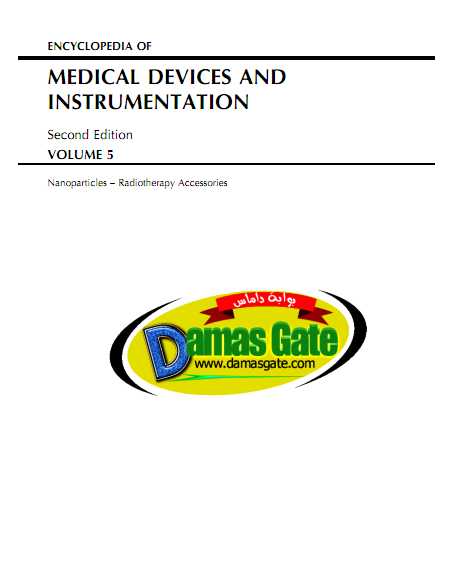Wiley - Encyclopedia of Medical Devices and Instrumentation - Vol. 5

PREFACE
The Encyclopedia of Medical Devices and Instrumentation
is excellent for browsing and searching for those new
divergent associations that may advance work in a peripheral
field. While it can be used as a reference for facts, the
articles are long enough that they can serve as an educational
instrument and provide genuine understanding of a
subject.
One can use this work just as one would use a dictionary,
since the articles are arranged alphabetically by topic. Cross
references assist the reader looking for subjects listed under
slightly different names. The index at the end leads the
reader to all articles containing pertinent information on
any subject. Listed on pages xxi to xxx are all the abbreviations
and acronyms used in the Encyclopedia. Because of
the increasing use of SI units in all branches of science, these
units are provided throughout the Encyclopedia articles as
well as on pages xxxi to xxxv in the section on conversion
factors and unit symbols.
I owe a great debt to the many people who have contributed
to the creation of this work. At John Wiley & Sons,
Encyclopedia Editor George Telecki provided the idea and
guiding influence to launch the project. Sean Pidgeon was
Editorial Director of the project. Assistant Editors Roseann
Zappia, Sarah Harrington, and Surlan Murrell handled the
myriad details of communication between publisher, editor,
authors, and reviewers and stimulated authors and
reviewers to meet necessary deadlines.
My own background has been in the electrical aspects of
biomedical engineering. I was delighted to have the assistance
of the editorial board to develop a comprehensive
encyclopedia. David J. Beebe suggested cellular topics such
as microfluidics. Jerry M. Calkins assisted in defining the
chemically related subjects, such as anesthesiology.
Michael R. Neuman suggested subjects related to sensors,
such as in his own work—neonatology. Joon B. Park has
written extensively on biomaterials and suggested related
subjects. Edward S. Sternick provided many suggestions
from medical physics. The Editorial Board was instrumental
both in defining the list of subjects and in suggesting
authors.
This second edition brings the field up to date. It is
available on the web at *.
com/emdi, where articles can be searched simultaneously to
provide rapid and comprehensive information on all aspects
of medical devices and instrumentation.
JOHN G. WEBSTER
University of Wisconsin, Madison
Download
*

PREFACE
The Encyclopedia of Medical Devices and Instrumentation
is excellent for browsing and searching for those new
divergent associations that may advance work in a peripheral
field. While it can be used as a reference for facts, the
articles are long enough that they can serve as an educational
instrument and provide genuine understanding of a
subject.
One can use this work just as one would use a dictionary,
since the articles are arranged alphabetically by topic. Cross
references assist the reader looking for subjects listed under
slightly different names. The index at the end leads the
reader to all articles containing pertinent information on
any subject. Listed on pages xxi to xxx are all the abbreviations
and acronyms used in the Encyclopedia. Because of
the increasing use of SI units in all branches of science, these
units are provided throughout the Encyclopedia articles as
well as on pages xxxi to xxxv in the section on conversion
factors and unit symbols.
I owe a great debt to the many people who have contributed
to the creation of this work. At John Wiley & Sons,
Encyclopedia Editor George Telecki provided the idea and
guiding influence to launch the project. Sean Pidgeon was
Editorial Director of the project. Assistant Editors Roseann
Zappia, Sarah Harrington, and Surlan Murrell handled the
myriad details of communication between publisher, editor,
authors, and reviewers and stimulated authors and
reviewers to meet necessary deadlines.
My own background has been in the electrical aspects of
biomedical engineering. I was delighted to have the assistance
of the editorial board to develop a comprehensive
encyclopedia. David J. Beebe suggested cellular topics such
as microfluidics. Jerry M. Calkins assisted in defining the
chemically related subjects, such as anesthesiology.
Michael R. Neuman suggested subjects related to sensors,
such as in his own work—neonatology. Joon B. Park has
written extensively on biomaterials and suggested related
subjects. Edward S. Sternick provided many suggestions
from medical physics. The Editorial Board was instrumental
both in defining the list of subjects and in suggesting
authors.
This second edition brings the field up to date. It is
available on the web at *.
com/emdi, where articles can be searched simultaneously to
provide rapid and comprehensive information on all aspects
of medical devices and instrumentation.
JOHN G. WEBSTER
University of Wisconsin, Madison
Download
*